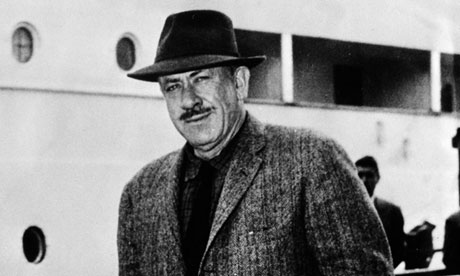Archives reveal that John Steinbeck, who beat Robert Graves and Lawrence Durrell to the Nobel laureateship in 1962, was a compromise choice

Incurring the wrath … John Steinbeck's
Nobel prize was heavily criticised as 'one of the Academy's biggest mistakes'.
Photograph: Popperfoto/Getty Images
Giant of American letters
John Steinbeck beat the
British authors Robert Graves and
Lawrence Durrell to win the Nobel prize for
literature in 1962, according to newly opened archives in Sweden – but he
was not a popular choice.
The Swedish Academy keeps
secret for 50 years all information about the authors nominated for the Nobel,
only releasing
their shortlist for the 1962 prize yesterday. The names of 66 authors were
put forward for the prize that year, with the shortlist consisting of Steinbeck,
Graves, Durrell, French dramatist Jean Anouilh and Danish author Karen
Blixen.
"There aren't any obvious
candidates for the Nobel prize and the prize committee is in an unenviable
situation," wrote committee member Henry Olsson, according to a
piece today by Swedish journalist Kaj Schueler in Svenska Dagbladet. Graves
was rejected, reveals Schueler, because even though he had written several
historical novels, he was still primarily seen as a poet. Olsson was reluctant
to award any Anglo-Saxon poet the prize before the death of Ezra Pound,
believing that other writers did not match up to his mastery; he further
dismissed Pound in response to his political stance.
Blixen, author of Out
of Africa, rendered herself ineligible by dying that September, and it was
decided that "Durrell was not to be given preference this year" – probably,
Schueler told the Guardian, because "they did not think that The Alexandria
Quartet was enough, so they decided to keep him under observation for the
future". Also a candidate in 1961, Durrell had in the previous year been ruled
out because he "gives a dubious aftertaste … because of [his] monomaniacal
preoccupation with erotic complications".
It is not clear why Anouilh was passed over, but the French poet Saint-John
Perse had taken the Nobel in 1960, meaning that France was well represented on
the roster of winners, and Svenska Dagbladet reveals that Jean-Paul Sartre, who
would win the prize in 1964, was starting to be seriously considered as a
candidate.
Steinbeck, therefore,
remained. Previously nominated eight times, it was widely felt that his best
work was behind him; Of
Mice and Men was published in 1937, The
Red Pony in 1945, The
Grapes of Wrath in 1939, The
Pearl in 1947 and East
of Eden in 1952. But the Academy's permanent secretary, Anders Österling,
believed the release of his new novel The
Winter of Our Discontent in 1961 showed that "after some signs of slowing
down in recent years, [Steinbeck has] regained his position as a social
truth-teller [and is an] authentic realist fully equal to his predecessors
Sinclair Lewis and Ernest Hemingway", revealed Svenska Dagbladet
No comments:
Post a Comment